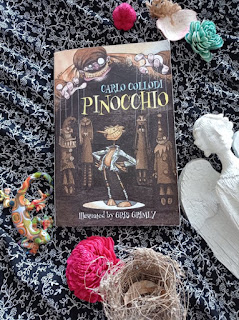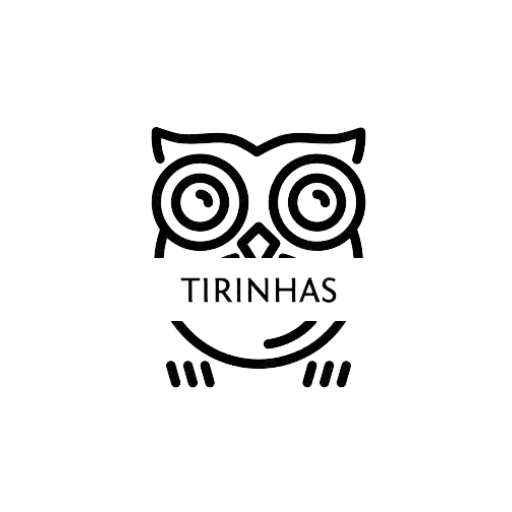Advertisements

A classic tale of misfortune and mischief.
A mischievous wooden puppet gets into trouble, disobeys his father, forgets his pomises and skips through life in search of fun. Just like a “real boy”. Until he learns that to become truly real, he must open his heart and think of others.
MY THOUGHTS:
I'm on a roll with my reading of old children's classics. Carlo Collodi's original tale of Pinocchio is considered 'picaresque'. I admit that I had to look this up and discovered that it refers to an episodic style of fiction that deals with the adventures of a rude and devious but attractive hero. Ah well, our wooden boy always seeks immediate gratification, even if that's not how the world works. He is naive and stubborn. He is easily deceived by other unscrupulous scoundrels. And he can be very reckless, as when he sells a hard-earned spelling book bought by his father to pay for his ticket to a traveling show. He fits the antihero bill indeed.
Pinocchio turns out to be the unluckiest and luckiest puppet that can be found anywhere. He's unlucky because some of his adventures really are the stuff nightmares are made of! Believe me! However, he is lucky because he somehow keeps managing to escape these horrible situations.
I picked this children's classic off the shelf without knowing if I would like it or not. Unfortunately, unlike other gems like Charlotte's Web, I give it an overall negative rating.
Firstly, this original story is not the sanitized version Walt Disney made of it, but much darker, nastier and more disturbing. Rather than an essentially innocent puppet with handsome, finely sculpted features, the original Pinocchio is more crudely formed and at times violently reactive. For example, there is a talking cricket, but his name is not Jiminy. He's just a well-meaning insect who starts giving Pinocchio advice and gets smashed against the wall with a hammer because of his pains! Yes, Pinocchio tends to be an act now and think later kind of guy. But what I object to even more is the hidden agenda that permeates the plot.
It's hard to see much charm in a load of Protestant/Industrial Revolution work ethic propaganda written to keep kids in line. Repeatedly the same theme is hammered into us readers; the value of hard work. It is chillingly shown through graphic incidents in the story or stated directly through the voices of moralistic mentor characters. Then, if we haven't already, it's shown and told to us once again. Sober and responsible wins the day, while lazy and disobedient gets you into all kinds of hot water.
Modern messages like figuring out how to work smarter rather than harder were in the future. It seems to have been written especially to keep the masses of blue collar workers in their place. And cutting through all the weirdness is a dark, unforgiving tone. Although making mistakes is an inevitable part of growing up, you wouldn't believe it reading this book. Poor Pinocchio has long periods of very hard and serious work, but every momentary lapse in seeking amusement or shirking his stern duty is severely repaid.
Circumstances force you to use the consequences of your weaknesses and transgressions for all to see and shame. He tells some lies and his nose grows longer. He joins some friends in a fun community, and first his ears become pointy donkey ears, and then they turn into donkeys! The horrible karma stuff gets a little too much. At one point, Pinocchio reflects: 'As long as I have been in the world, I have never had a happy quarter of an hour.' I found this very moving, because it seems to me that its dogmatizing author wanted to keep it that way.
Even Pinocchio's happy ending is all about conforming to being like everyone else. From the beginning, he hates the limitations of being a puppet and dreams of becoming a real, flesh-and-blood boy, like the ones he goes to school with. We should rejoice with him when his fondest dream finally comes true, and he will likely join the ranks of poor commoners like his father Geppetto, starving in silence or working himself to the bone for a crust. If I were Pinocchio's friend, I would have kept reminding him that real little boys are a dime a dozen, but a puppet that talks, eats and emotes, made from a sensitive block of wood, is something truly rare and special. If you're looking to inspire your kids with a book about valuing your own uniqueness, this isn't it.
Still, the incidents can be vaguely fun to read just to see the stereotypical, typecast evil of the villains that appear. Take the supposedly lame fox and blind cat who suck up to Pinocchio, seducing him with tales of the fake Field of Miracles because they want to rob him. Pinocchio falls for his too-good-to-be-true tales with characteristic naivety, but Collodi challenges readers to be wiser, just because of who they are. A fox and a cat. Hmm, you wouldn't expect these guys to be a bit cunning and predatory now, would you?
I end with this fun ad that lures fools into the Land of Boobs that hundreds of lazy boys ages 8 to 12 couldn't resist. 'On Thursdays there is never school, and each week consists of six Thursdays and one Sunday. Just think, fall vacation starts on the first of January and ends on the last day of December.
Heavy, but hey, it still appeals to me. It almost seems worth becoming an ass.
In short: The character Pinocchio is likable, but the story Pinocchio not so much.
🌟🌟½



